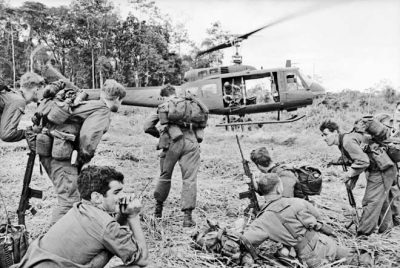By
Rupen Savoulian
In August 2016, Australian government officials and the corporate media denounced a decision by the Vietnamese authorities to downgrade the scale of the fiftieth anniversary commemorations of the Battle of Long Tan.
The Hanoi government, after much diplomatic wheeling-and-dealing, decided to reduce the scope and extent of the planned ceremony for the Long Tan battle. The event itself was intended to be on a much larger and more lavish scale than previous years, with a concert planned and that visiting Australian veterans were to wear their full uniforms and medals. The Vietnamese government decided to deny permission for such an event to proceed, and returned to their usual practice of allowing a low-key event.
The fact that a controversy erupted in the pages and web sites of the major Australian newspapers and media outlets is quite telling – it reflects on how Australians are manufacturing the memories of the Vietnam war. This particular battle is usually depicted as an unequal contest – a David-like Australian contingent, far outnumbered by the superior Goliath-like Vietnamese enemy, bravely holding out and winning against insuperable odds. This way of commemorating the battle, couched in terms of Australian courage in the face of overwhelming enemy advantage, plays an important role in disguising the true nature of the Vietnam war. The hypocrisies that surround this commemoration allow us in Australia to remember the Vietnam war, not as a savage assault by a militarily superior imperialist power against a rural people fighting for their independence, but as a study in platitudes.
Binoy Kampmark, writing in Counterpunch magazine, elaborates on the hypocrisies of this type of commemoration. The war of US imperialism against Vietnam, extending over decades, was a sustained assault on the majority of the population. The Vietnamese were firebombed, scorched, poisoned and tortured, and are still dealing with the calamitous consequences of that attack until today. While Australia’s role in that particular slaughter was only small, it was however complicit. The Australian government at the time, headed by then Prime Minister Robert Menzies, deliberately and aggressively pushed for a more active combat role in Vietnam.
While Canberra does play the role of subservient underling to the imperial power of the North, it never forgets its own calculated and cynical self-interest. Menzies and his cabinet colleagues aggressively lobbied the power-that-be in Washington for an Australian military mission in Vietnam; they did not wait to be asked. Participating in the assault on Vietnam was motivated partly by Menzies’ anti-Communist ideology, but also partly by self-interest. As the Canberra authorities saw it at the time, making a small investment now on the side of the Americans would pay large dividends in the long-term.
The Australian socialist writer and activist Tom O’Lincoln wrote about Australia’s contribution to the Vietnam war:
One way Australia’s peculiar boutique imperialism is presented as superior is to suggest our troops are free of war crimes. Is it true? The Australian troops in Vietnam committed no major massacres, but there’s much more to be said. The main culprits of atrocities are not the soldiers at the front line, but the leaders in Canberra and their mates who backed – even-egged on – the genocidal American war effort.
The commemoration of Long Tan attempts to wash away any guilt about or association with the crimes of US imperialism in that country. How can a heroic stand by a small and determined troop of Australian soldiers against a numerically superior enemy be considered part of a larger criminal enterprise?
The battle itself was the largest loss of Australian lives in a single battle – 18. Each one of these deaths is an individual tragedy, and the families of those killed live with the trauma and emotional scars of that time. We would do well to remember that the losses sustained by the Vietnamese in that battle were ten-fold the number of non-Vietnamese casualties. The Australian veterans of that conflict are fully entitled to commemorate their experiences as they see fit – in Australia. To travel to the country that was devastated by the conflict, a victim of a larger imperial assault, and expect their views to correspond to ours indicates either a willful conceit to expunge Vietnamese suffering from remembrances of the war, or a startling ignorance about the impact of that war on the domestic population of Vietnam.
Allen Myers, long-time socialist and activist, wrote in an article for the Red Flag newspaper ‘What’s behind the carry-on about Long Tan?’ that there are definitive political objectives behind the fuss about Long Tan;
The reason is that the veterans are being used by Australian governments and media, who want us all to believe that wars waged by Australian governments can be noble and just and worthy of our support. This propaganda strategy uses the bravery and sacrifice of the soldiers involved to conceal the vile purposes of the people who organise and benefit from war.
To do this, the propagandists seize on one or a few events and build a myth around them, attempting to make them emblematic of the whole war so that we will forget what it was really about.
It is interesting to note that at the official Long Tan commemorations in Canberra, there were a number of activities, including aircraft flyovers by two B-52 bombers from the United States air force. It was the US air force’s use of the long-range B-52 bombers, carrying out the indiscriminate bombing of densely-populated regions of Vietnam, Laos and Cambodia for years, that cost so many millions of lives. It was not just the carpet-bombing that devastated the region and resulted in millions of casualties, but also the constant use of chemical defoliants.
Rather than react with arrogant and condescending indignation regarding the decision of the Vietnamese authorities, there is another course of action open – disagree, but respect and accept their decisions about affairs in their own country. Let us remember the Vietnam war, address the trauma and suffering of that conflict, but avoid turning Long Tan into a shrine to aggressive militarism.



No Comments Yet!
You can be first to comment this post!